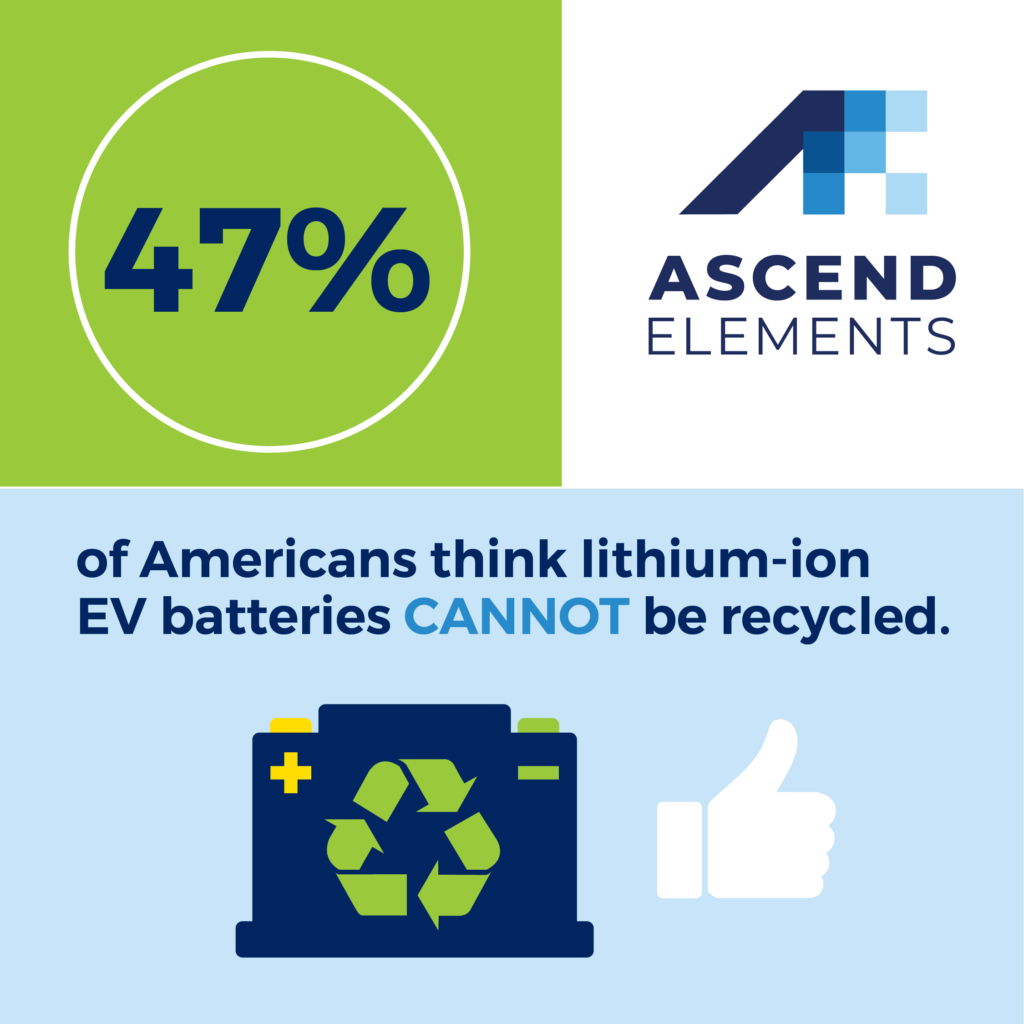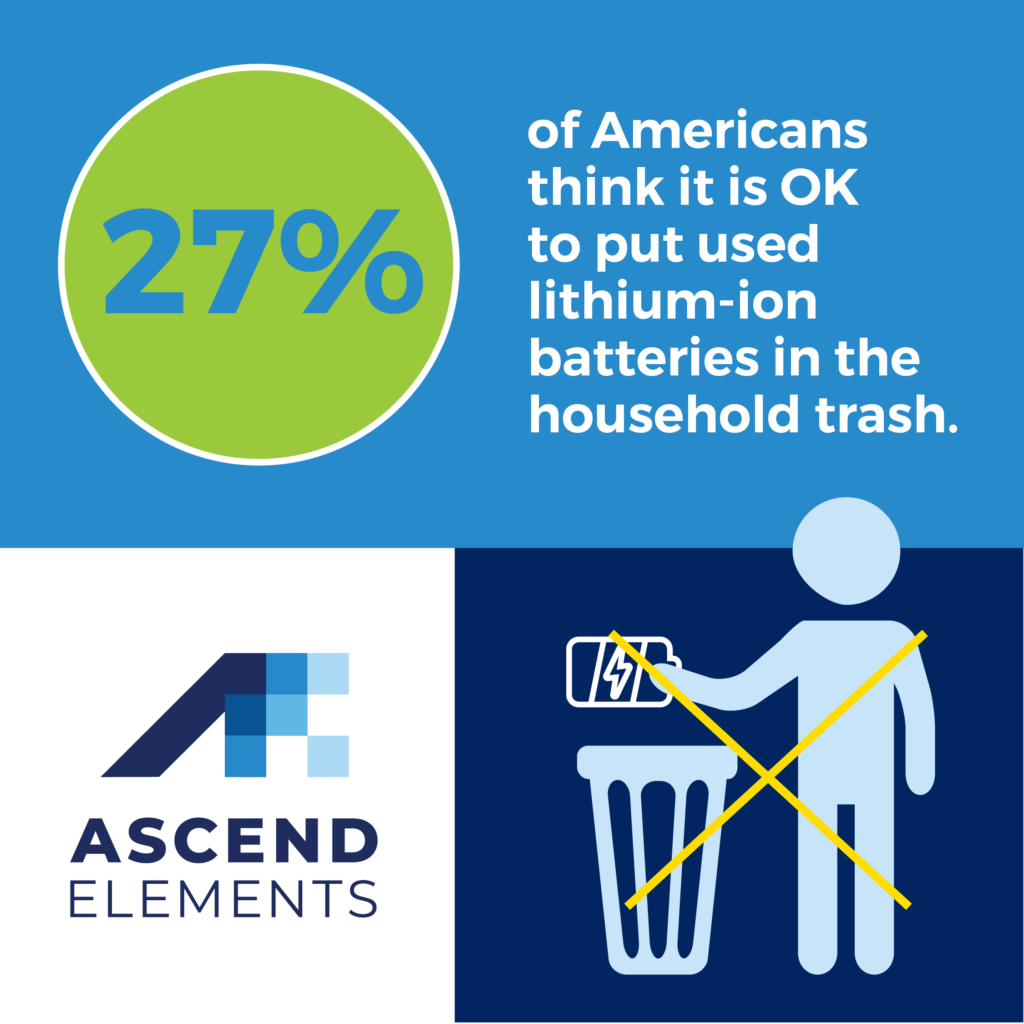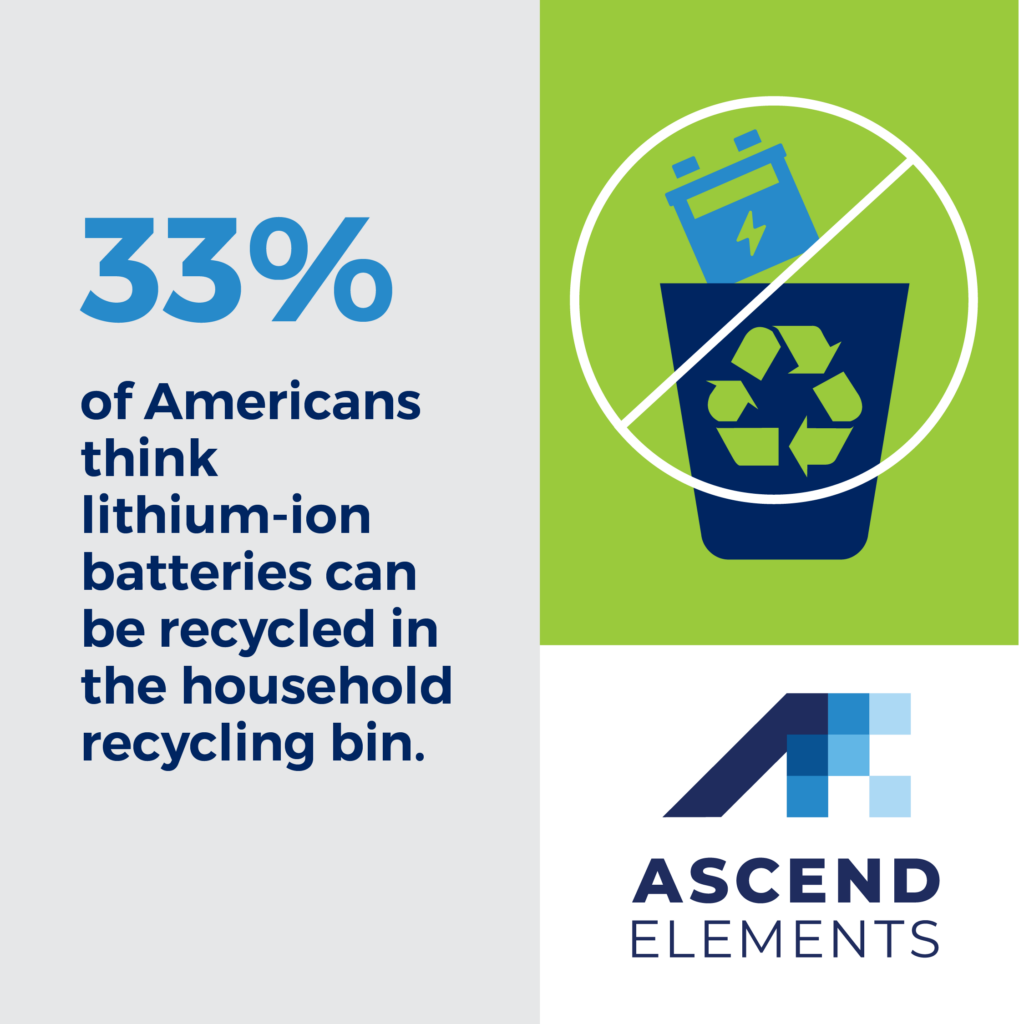Nearly half of U.S. consumers think lithium-ion EV batteries are NOT recyclable
WESTBOROUGH, Mass., (December 13, 2022) — Electric vehicle battery recycling is a booming industry – and the key to lowering the carbon footprint of EVs – but nearly half of Americans mistakenly believe lithium-ion EV batteries are destined for landfills. A new study commissioned by engineered battery materials company Ascend Elements found that 47% of Americans think EV batteries cannot be recycled. More than one third (37%) of Americans don’t understand that recycled lithium-ion battery materials can be used to make new EV batteries. Only 39% of Americans understand that the critical materials in lithium-ion EV batteries can be recycled over and over without performance loss. The study was conducted by an independent research firm to survey a random sample of 1,004 US consumers about their beliefs and attitudes regarding battery technology and electric vehicles. The margin of error for is +/-3% at the 95% confidence level.
“We’ve encountered many myths and misconceptions about electric vehicles and, in particular, EV battery recycling,” said Roger Lin, VP of Marketing & Government Relations at Ascend Elements. “The industry has made terrific advances in the efficiency and cost-effectiveness of lithium-ion battery recycling, but these false narratives about EV batteries continue. We are changing that by creating an infrastructure that would make it unthinkable to let a lithium-ion battery go to landfill. They are just too valuable.”
According to the study, more than half (53%) of Americans say their attitude toward EVs is more positive than it was just three years ago.
- 46% say electric vehicles will outsell gasoline-powered cars in their lifetime.
- 59% say electric vehicles (EVs) are better for the environment than gas-powered cars.
- 59% say electric vehicles will save them money over the lifetime of the vehicle.

But many myths and misconceptions remain, including potentially dangerous misunderstandings:
- 33% of Americans mistakenly believe lithium-ion batteries can be recycled in the household recycling bin.
- More than one quarter of Americans (27%) think it is OK to put used lithium-ion batteries in the household trash.
“For the record, lithium-ion batteries should never be put in the trash or the household recycling bin, but these survey responses help explain why we sometimes see fires and explosions in waste management facilities and recycling centers. Used batteries should be dropped off at authorized collection points, many of which can be found at the big box hardware stores,” Lin said. He suggests checking the call2recycle.org website to find the nearest drop-off location.


Other notable survey findings include:
- 40% of US consumers say lithium-ion electric vehicle batteries aren’t really “greener” than internal combustion engines.
- 50% of US consumers say owning an EV means they’ll need to wait in long lines for charging stations.
- 53% of US consumers think EVs are more expensive to repair.
- 47% of US consumers think too many EVs will overwhelm the power grid.
- 41% of US consumers think electric vehicles are too small and slow compared to gas powered cars.
- 51% of US consumers say lithium-ion electric vehicle batteries don’t offer as much range as internal combustion engines.
- 54% of US consumers are concerned about what we will do with all these lithium-ion EV batteries after they reach end of life.
- 48% of US consumers think that EVs will cause toxic landfills full of old lithium-ion batteries.
- 40% of US consumers say the batteries in electric vehicles are more dangerous than the gasoline in internal combustion engine vehicles.
- 38% of US consumers think that lithium-ion electric vehicle batteries are sourced using destructive mining techniques.
- 45% of US consumers think the US isn’t competitive when it comes to manufacturing lithium-ion electric vehicle batteries.
Lin said the survey points to an industry-wide need for improved consumer education and outreach about lithium-ion batteries and battery recycling best practices. An executive summary of the survey results is available for download.
About Ascend Elements
Based in Westborough, Mass., Ascend Elements is the leading provider of sustainable, closed-loop battery material solutions. From EV battery recycling to commercial-scale production of lithium-ion battery precursor (pCAM) and cathode active materials (CAM), Ascend Elements is revolutionizing the production of sustainable lithium-ion battery materials. Its Hydro-to-Cathode™ direct precursor synthesis technology produces new CAM from spent lithium-ion cells more efficiently than traditional methods, resulting in reduced cost, improved performance, and lowered GHG emissions. With fewer batteries going to landfill and a cleaner manufacturing process, Ascend Elements is taking the lithium-ion battery industry to a higher level of sustainability.
MEDIA CONTACT:
Thomas Frey, APR
Ascend Elements | [email protected] | +1.734.658.0143
